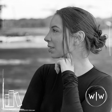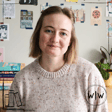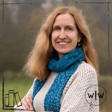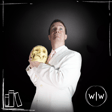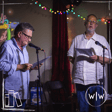Become a Creator today!Start creating today - Share your story with the world!
Start for free
00:00:00
00:00:01

237 Marilia Savvides | Literary Agent
Literary agent, Marilia Savvides joins us this week to talk about her career and experiences in publishing and starting her own agency, The Plot.
Support the show on Patreon! 💖 And get extended episodes, ad-free and a week ahead of everyone else. 🙏
For audio listeners:
Listen to The Chosen Ones and Other Tropes, Jamie's other podcast with Melissa Welliver and Naomi Gibson! 📚
Follow on socials! 🥳
Transcript
Introduction of the Podcast and Guest
00:00:00
Speaker
Ooh, a spicy question. love it. Because the writing is sort of everything, right? Like you can fix plot holes, but if the writer... So some readers love that and some readers are like, but I wanted more of this. So it's kind of, it's kind of a gamble.
00:00:14
Speaker
Hello and welcome back to the Right and Wrong podcast. on today's episode, I am with literary agent and founder of the plot agency, Marilia Savides. Hello. Hello and thank you for having me.
00:00:27
Speaker
Thanks so much for coming. um Let's hit the ground running here and jump in with a bit about you and your kind of journey into publishing.
00:00:38
Speaker
am i i did a little bit of research. Am I right in thinking you have a law degree? I do have a law degree indeed. Yes, I did go down that route um straight out of school. um And then sort of really enjoyed that. I went to UCL. It was a great sort of, it was a really tough degree, but it was extremely interesting.
00:00:57
Speaker
But I did find that at the end of the degree, i I realized that I was more in love with fictional sort of accounts of um any sort of legal issue than I was with the actual law.
00:01:10
Speaker
um The moral sort of gray areas, I don't think lived with me um yeah as comfortably. And I realized that I just spent my entire law degree despite the huge sort of workload, squirreling away paperbacks constantly and just reading.
00:01:26
Speaker
And so at the end of the law degree, i was like, maybe what I was attracted to in the first place was, you know, all the books that I was raised on um things like To Kill a Mockingbird, and then obviously the more fun commercial sort of Grishams.
00:01:40
Speaker
I think that's what I imagined the law looked like. um So I realized that I kind of wanted to be closer to books. Okay.
Foundation of Marilia's Career
00:01:49
Speaker
And then did you get, you went to, you did a publishing course in New York.
00:01:55
Speaker
I did indeed. Yeah. Um, that was sort of, i was looking around for what I could possibly do to learn more about the industry because it is so difficult to sort of get any information, especially back then.
00:02:09
Speaker
Um, and it was one of the courses that popped up and it seemed to be a really sort of intensive, but also um you know, professional led course, which felt quite practical.
00:02:22
Speaker
And then obviously my obsession with New York also played a role. So I applied and I was very, very lucky to get in. And yeah, I mean, it was the sort of foundational experience for, for the rest of my career, for sure.
00:02:37
Speaker
Okay. Was it a sort of like broad, like this is what publishing is and here's a kind of snapshot of each the different, each of the different parts of publishing? Yeah, that's a big part of it. It's sort of, you know, you have editors, agents, everyone, like from every sort of possible niche of publishing, someone professional working in the industry today will come in and talk to the students about what their job is like.
00:03:00
Speaker
And so, you know, we had everything from production to sales, to marketing, to publicity. And then the late, great Ed Victor came in to give a talk on agenting.
00:03:12
Speaker
And I remember, you know, he spent a lot of his talk talking about the author care part of the job, the discovery part of the job, but then also took us through ah contract line by line. And then I was hooked because I was like, there is a job that marries my obsession with the creative element, but also I get to do contracts like perfect.
00:03:35
Speaker
um So that's sort of where I got up my my first real holistic understanding of how many different hats this job entails. Ah, okay.
First Publishing Experiences
00:03:45
Speaker
And after New York, you came back to London.
00:03:49
Speaker
and then is that when you started at PFD or was it a bit later? I first, um, my first sort of internship in publishing in London was with the brilliant Daniela Schlingman, who's a literary scout.
00:04:01
Speaker
And I worked with Daniela for, I think around a year. Um, and I sort of went in not really knowing what scouts do, um but it was a completely fascinating sort of crash course into publishing because you get to sort of have this unbelievable bird's eye view of the entire industry.
00:04:21
Speaker
And it sort of also teaches you to hone your understanding of what um genres and sub-genres work ah for publishers, depending on what it is they're looking for. So it sort of teaches you how to engage in um targeted sort of thinking in that way.
00:04:41
Speaker
But also it gave me this brilliant oversight into what a universal story looks like. So the kind of book that would appeal a German publisher as much as it would appeal to a Japanese publisher, what what are those stories? And as someone who didn't grow up in England, I think those are the ones that I tend to fall in love with the hardest, just because there are certain stories I think that are So universal um that there will be appeal just in every country, in every language.
00:05:09
Speaker
Yes, absolutely. So it sounds like you kind of cut your teeth in publishing in quite an international way. First in i did the US, then you came back, then working with a scout kind of internationally.
Exploring Translation Rights
00:05:21
Speaker
thus yeah That must have set you in good stead when you, did you later go on to work in translation rights? Yeah, translation, exactly. That's how I started at PFD and I loved my time doing translation rights at PFD. I was part of a great team.
00:05:35
Speaker
And again, it was an incredibly... it was ah you know I did it for for a long time. I did it for about five five years, I think. And you know besides the fact that I i had the most incredible um opportunity in terms of travel, you know going to book fairs around the world and meeting publishers from all different kinds of backgrounds, understanding different cultural sort of issues, what one audience might enjoy, what another audience might not get.
00:06:05
Speaker
um It was just, again, such an incredible... look into the stories that connect everyone the most. um And when you have those kinds of books to sell that, you know, 10, 20, 30, 40 languages, 40 publishers were interested in, that's kind of the most exciting possible situation to be in where there's a real sort of um connection across the board with a ah piece of work.
00:06:34
Speaker
Yeah. When a story sort of transcends cultural divides and things. Yeah, yeah, yeah. Exactly.
Becoming a Literary Agent
00:06:40
Speaker
um and And so you were you a PFD for, it was eight years, I think. Yes, indeed.
00:06:48
Speaker
ah primary agent. How long were you doing the translation stuff? And then then then how long were you a literary agent? I think translation was probably about five, must've been about five years in translation, maybe six.
00:07:02
Speaker
And then at some point, I transitioned over into also signing ah my own clients. And then eventually that moved into a full-time sort of primary agenting position. But for a period of time, i was doing both.
00:07:15
Speaker
um So I'm not quite sure when it happened. It was quite organic. yeah and So I couldn't really give you a a precise date. But um yeah yeah, that's sort of how it happened for me.
00:07:26
Speaker
That always seems to be the way with literary agents is they sort of, yeah they're doing one role and then that bleeds into the next role. And there's like a big period of crossover and doing both. And that sort of just phases into eventually just being the literary agent.
00:07:40
Speaker
Yeah, exactly. And I think that is, it depends because we all come from pretty different, you know, backgrounds, training, Our way into the industry is often very different. A lot of people come over from editorial, others start out in agencies and become, and you know, an assistant to a primary agent from day one.
00:07:59
Speaker
It's just very, you know, there's so many different versions of how this will look in the same way that once you are an agent, you know, we all sort of approach the job differently. There's no sort of, you know, um checklist of what an agent is.
00:08:16
Speaker
And so everyone sort of figures out for themselves what they want that job to look like for them. Yeah. There's lots of different directions that people come into it from. Exactly. And different strengths and all of that.
00:08:27
Speaker
Yeah. Yeah. Yeah, exactly. I mean, in speaking of that, I would imagine you as an agent now, given that you have all the experience doing the different markets and the translation stuff, do you kind of do all of that just as part of your, your role?
00:08:43
Speaker
I don't actually, i um partnered with Rachel Mills Literary and Alexandra Cliff there, who actually was my colleague BFT for a very long time and I adore her. And she's known my list from, you know, its infancy basically.
00:08:58
Speaker
And so once I, I was able to, I partnered with um ah RML because I do really believe that you need someone who is consistently specialized in that area that maintains that kind of ongoing The way that I do with the UK and the US markets sort of keep in touch with everyone regularly.
00:09:17
Speaker
think you do need that kind of um granular level of understanding of what the market is doing today, not just what it was doing sort of a year ago because it shifts so dramatically. um yeah, so yeah it's it's a delight, though, having her on board and having the team on board there.
00:09:34
Speaker
Okay. Okay. That's yeah, that's interesting to know. um and then after PhD, you spent some time with 42 management and production.
Book Division and Film Adaptations
00:09:41
Speaker
Was that setting up a book division for them? Indeed. Yeah. Alongside Eugenie Furness, I went in and helped set up the sort of bones, really the the the structure of a book agency within the larger 42 company.
00:09:57
Speaker
And so that was, yeah, that was brilliant. And 42 really gave me an opportunity to also learn more um about book to film, about what a film or TV deal looks like.
00:10:13
Speaker
I got to meet a lot more producers to talk to them about my authors. Some of my authors got to dabble and now are working also like in parallel full time as screenwriters.
00:10:25
Speaker
um I also discovered a few authors via screenwriting um who are now novelists and that I work with. So it was a very sort of, you know, creative melting pot situation of,
00:10:39
Speaker
you know, yeah are there people here who are dreaming of writing a novel, you know, and who can do it? And then okay vice versa. Some of my novelists very much yeah hugely also talented in, in writing for the screen. So yeah it was a great partnership.
00:10:57
Speaker
Okay. That's really cool. So yeah, your sort of, your journey seems to continuously be your learning new skills and learning about new parts of the the industry. And I would imagine helping 42 set up that division of the, of the group would set you in good set, like probably taught you a lot when you came to actually setting up your own agency, the plot agency.
Founding the Plot Agency
00:11:19
Speaker
Absolutely. Yeah. I mean, everything from You know, the the sort of backend systems, you know, the the software that you'd need to start database or building a website, you know, what what do we want that to look like?
00:11:33
Speaker
um Coming up with the core genuine message of what ethos you want the company to have. All of those things were things that I learned and honed while I was at 42, when I was doing it, you know, as an agent 42.
00:11:47
Speaker
And then when it was time to set up the plot, it felt like it was a skill that I'd already, you know, um, I'd already built.
00:11:58
Speaker
Was it something you'd been thinking about for a while, making your own agency? Yeah. And it was scary. Of course it was, but I do think that it was, it, it felt like the right time to sort of,
00:12:09
Speaker
take the leap because there's never really going to be a right time to do it. It's always going to be scary and difficult. um You know, if you're earning a ton, for example, with your authors, making the jump is scary because you're going to leave all that commission behind. Right.
00:12:25
Speaker
And then doing it and feeling a bit wobbly about it if If you're, if it's so much in its infancy, your career, that it's really sort of unpredictable what kind of income you might have, then it's terrifying.
00:12:37
Speaker
I think I tried to choose a moment when it was something in between where I could survive, but not sort of feel like I was leaving too much behind. um but it felt like the right time just because I think I wanted to be able to shape, you know, the the way that I work into the agency, right? I wanted...
00:12:59
Speaker
the sort of global outlook. I wanted the fact that I had authors from all over the world and that I worked with. I just wanted that to be part of the core messaging because I really do believe that there are incredibly talented people in every country.
00:13:14
Speaker
And yeah, I don't see why we have barriers to storytelling. Yeah. I mean, absolutely. There's this, especially with the, you know, where technology is at the moment where exactly you have to account for time difference, but you can speak to anyone around anywhere in the world at any time. So, so let's talk about the list then.
00:13:35
Speaker
Um, yeah.
Representing Adult Fiction
00:13:36
Speaker
As a, as a literary agent, as an agency, uh, what, uh, what are the genres and ages that that you represent? So I represent, I would say i don't really do any children's.
00:13:48
Speaker
Um, I do No YA though, I could be persuaded if it was something that I totally fell in love with because I do adore YA. It's just not where my natural instincts lie as an agent because they are slightly different hands.
00:14:02
Speaker
um But then I mostly focus on adult fiction really. And then I do some nonfiction as well. um But it is, you know, mostly adult fiction.
00:14:13
Speaker
And within that, I would say that I tend to go more for a darker subject matter in general. So everything from crime and thriller, ah love a high concept in general, just absolutely adore something that feels like a new idea.
00:14:27
Speaker
um I love dystopian fiction. i love grounded horror. i love grounded sci-fi. Um, And then on the other side, I do also enjoy warm hearted books as well, but for that to work for me, it's going to have to have like a very strong voice.
00:14:46
Speaker
And generally speaking, I do tend to go for things that are on the sort of, you know, um in industry speak, sort of upmarket commercial space. So not super commercial, but not sort of super literary either. Accessible okay is what I would say.
00:15:03
Speaker
Yes. Okay. Okay. but And when you say high concept, it's one of those phrases that I think I know what it means. And then someone says it and I'm like, do I know what it means? What do you mean by high concept?
00:15:15
Speaker
So high concept to me is like, you know There's obviously stuff like high concept thrillers where you'll take a thriller idea and you'll you'll twist it. right So um something like, for example, there's a TV. I don't know why this is the first thing that comes to mind, but this is how your brain works when you're being recorded. um But for example, there's a show that came out this year, a TV show called Paradise.
00:15:39
Speaker
which I feel like if actually let's scratch that. Cause if I pitch this, it's a complete spoiler. Um, he yeah. Um, I know the show. Yeah. It's brilliant. But like not the best example. Um, oh my God, why am I blanking on this?
00:15:53
Speaker
Okay. Give me second. I'm trying to think. Would something like Gone Girl be high concept? I mean, no because the pitch itself, of Gone Girl is quite a straightforward thriller. You know, it's a woman who goes missing.
00:16:06
Speaker
And that's kind of the premise. I think High Concept is usually a twist for me, at least, is usually a twist on the pitch itself is the thing that makes a high concept. It's not necessarily the execution. i think Gone Girl in execution ends up being a more high concept novel because of the twists that come in the book.
00:16:26
Speaker
But in terms of high concept thriller, it's something that sets up ah the world ah that we are in as it is, and maybe is has a thriller sort of story at its core, but it has that little sort of thing that makes it slightly new. Blake Crouch, you could argue as high concept.
00:16:44
Speaker
Um, it's, I mean, it sort of sounds like it's only high concept the first time it's done in a way. Well, that's the thing. Yeah. It's something that feels new enough. Like the sixth sense when it came out Exactly.
00:16:58
Speaker
Exactly. It's got a clear, concise premise, right? It's one of those things that you pitch and people get goosebumps from the fact that it feels new, right?
00:17:09
Speaker
So something like even Inception or The Martian could be a good example of a high concept novel. Even though those will fall into the sci-fi space, there's a reason they're so accessibly loved um across you know the spectrum of readers and beyond sort of sci-fi readers.
00:17:29
Speaker
There's a reason why those books are very accessible. it's because They are essentially either a suspense novel at heart with a really strong voice and a sort of ticking time bomb situation going on in The Martian.
00:17:40
Speaker
It just sort of happens to be on Mars, right? And of course, there's a lot of science involved, but you, even as a non-science fiction reader, people have adored that but book because it's about the journey of the hero, right? Yeah.
00:17:53
Speaker
And then similarly, something like incetion Inception is obviously extremely high concept. It's got that, you know, big world idea of, you know, a dream within a dream within a dream kind of thing.
00:18:04
Speaker
um And it does that beautifully. And that has attracted audiences that wouldn't necessarily watch something like Star Wars, for example. Right. Sure. So it's more about the sort of novelty of the concept and like and it needs be something new that you've not seen, at least in that way before. Exactly.
Trends in Publishing
00:18:22
Speaker
And like high concept can also be, you know, like the movie Groundhog Day is a high concept idea, you know, which I know is a very old example, but it is about a man that keeps waking up on the same day.
00:18:35
Speaker
And that is why you'll see things like high concept, you know, women's fiction or high concept rom-com. there's a lot of new mashups going on with that idea. Again, not new Groundhog Day was, I think, made in the 80s.
00:18:48
Speaker
But it's that idea that you can bring something like a Groundhog Day into a rom-com genre, for example, right? It doesn't have to just live in the thriller space. But I think, um yeah, in the thriller space is is where I usually get most excited.
00:19:04
Speaker
Okay. And that's more of a personal preference than anything? Yeah. Yeah, I think so. I just get i just love the idea of you know, seeing a pitch or hearing about a book that feels fresh in terms of how it's going to look at the world and how it's going to either solve a puzzle or how I'm going to watch people go through difficulty.
00:19:22
Speaker
in a world that isn't quite, you know, our own. It's very long winded way of explaining. Please feel free to edit as you you fit. so Somewhere in there, there'll be some great wisdom that we can put together.
00:19:35
Speaker
Um, sure. So back on your list, how much of your, you mentioned most of it's fiction, but there is some nonfiction. What kind of, um, fraction or percentage percentage is, is, is the split between fiction and nonfiction?
00:19:48
Speaker
Oh, i'd say it I'd say it's probably 80-20. Okay, right. And yeah, that's about right, I think. That's about where you kind of like, you're not like trying to balance it out more to a 50-50 space. That's kind of what where you like it being.
00:20:03
Speaker
Yeah, i'm more I think I'm most comfortable here. Again, that might shift in the future. It's it's hard to as an agent to say sort of, this is where I'm going to always live just because you shift as a reader as well and the market shifts and there's a million reasons. course.
00:20:17
Speaker
um generally speaking, the non-fictions i the nonfiction ideas I go after tend to be things that I either I'm really interested in as a subject matter of myself, or so i I will approach the author, I've really liked the way a creator sort of done something in a different medium that I can sort of talk to them about.
00:20:39
Speaker
um So it it varies, but I do tend to go for stuff myself as opposed to the other way around in nonfiction. Okay. So most of a nonfiction you've actively pursued.
00:20:50
Speaker
Yeah. Yeah. In some. Okay. Okay. Okay. Um, and while we're talking about the shifting moods of publishing, um, before we head to the desert, I wanted to ask the ever shifting. Yeah.
00:21:03
Speaker
Never standing still for a second. Um, I wanted to ask about trends. So obviously, romanticcy has been a bit all encompassing recently. Yeah. And there's, there's a few other trends, you know, like cozy crimes had a bit of a moment crossover horror, those those kinds of things. There's other trends, but As someone who's got their finger on the pulse of of publishing, do you see any kind of like, um any kind of rising ah genres at the moment, anything that might have a moment kind of upcoming?
00:21:33
Speaker
I think that I, so I'm not a huge fan of trend watching slash chasing. Obviously I keep an eye on it, but what I mean is my sort of philosophy on the, on the trend conversation is I think because when I was coming up, psychological suspense and sort of domestic psychological suspense was the biggest thing. And it sort of went on for many, many years. Right.
00:21:56
Speaker
And so that was a trend that I think had the kind of, longevity and consistency that could be maintained for a very, very long time. And that of course was in huge part, sort of an effect of part of the Gone Girl effect, right? That's sort of, I think when it kicked into high gear was this realization that we can sort of bring back those relationship thrillers in this big way.
00:22:19
Speaker
um They never really totally go away, of course, but that was sort of its golden age at the time. I think since then, publishing has sort of been struggling to find ah replacement for something as big and as broad.
00:22:33
Speaker
So I think since the psychological suspense sort of boom, deflated a little bit, um because as we often often do in publishing, we sort of oversaturated it. I think we've been looking for what the next thing will be that is similar to that.
00:22:49
Speaker
amount of um enthusiasm and the same, again, I think that went on for about eight years. So, you know, what's that next thing? And I, I'm not sure we're going to have that again in any time soon. Obviously, romanticity has been huge and it's a wonderful thing to see so many people engaging in fiction who maybe have put it aside um who maybe were a bit bored of the stuff that was coming out.
00:23:17
Speaker
To see the sort of level of enthusiasm and of and engagement has been really beautiful because a lot of that was reader-led. It really was a lot of proper passion for for the characters, you know, for the world that they were inhabiting.
00:23:33
Speaker
And so I think it's been gorgeous, but it's hard to predict. And I do think that with elite times in publishing being, you know, usually 18 months from when a book sells, you know,
00:23:44
Speaker
by the time a book comes out, it might be a completely different market. So yeah I tend to sort of look at more general, I would say, spaces that i would go for it as a reader.
00:23:58
Speaker
And that's what I use as a metric, really. The thing that I would say that I'm excited about is that I think there is a lot more appetite than there used to be for sort of mixing genres, which we've seen obviously with Romanticity.
00:24:13
Speaker
But I love the idea of the fact that there's more space for, you know, horror that's more grounded or things that are really playing with different elements and different spaces, because I, I love the books that don't really fit into one category. I think those are often the ones that speak to people the most when they're done well, you know, those do often have longevity,
00:24:36
Speaker
in readers' minds as well, because they feel new and special. And so that is a really welcome, wonderful sort of, um yeah, a wonderful look into the future, I think.
00:24:50
Speaker
I'm seeing more and more people opening up to more genres. so Yeah, absolutely. I've definitely seen a lot of um books doing really well that are essentially taking two quite set genres and just kind of like crossing them together and seeing how that works out.
00:25:05
Speaker
And that's fun because a lot of people are reading across these genres. They're familiar with the tropes of the genres. So when you put them together, it's exciting for them to see how you've worked those in. Right, exactly. I mean, even the Ministry of Time is a brilliant example, you know, where she did such a phenomenal job of bringing in like quite um elevated, but also quite a classic sort of almost pride and prejudice dynamic, right. Of, of rom-com, but in a contemporary setting.
00:25:35
Speaker
And then obviously the, the time travel twist just completely made it a breath of fresh air. And the reason that book works is definitely the characterization and the chemistry, but I do think that the time travel element just adds so much natural,
00:25:49
Speaker
joy for lack of a better word to the experience it's just it feels fresh and and fun yeah yeah absolutely um we are at the time in the episode where i um ship you off to the desert island and ask you if you were stranded on the desert island with a single book which book do you hope that it would be So I, sorry, Jamie, no offense, but i do hate this question.
Desert Island Book Choice
00:26:16
Speaker
And the reason I do, this is not personal.
00:26:18
Speaker
The reason I hate this question is because I think most agents sort of tend to get into this work because we have fallen in love with several different books throughout our life that have sort of led us here. It's sort of an obsession with usually um a larger maybe selection of books than the average person, because we are obsessive readers first and foremost.
00:26:42
Speaker
So it's such a very hard question to answer. And I won't do the thing that I was going to do, um which is to sort of um cheat a little bit and say, take a Kindle and a solar charger.
00:26:54
Speaker
But I think if I had to pick one and this might feel bit left field and I might be cheating again, but it's okay. Cause it's books. Yeah. but I think it would have to be the Hunger Games.
00:27:06
Speaker
And if I could take the trilogy, I'd be happiest. um I'm sure originally someone has bound all three of those together. Yeah, exactly. so I'll just take a giant, like one giant copy and or I will bind them myself.
00:27:19
Speaker
I think, you know, having gone gone through in my brain, so many books I've completely like, you know, reshaped me and, and changed my molecules. I think the Hunger Games I read at an age when you know, I was sort of in my early twenties and still young enough to sort of have that real excitement about new ideas. Again, I still have it. i mean, who am I kidding?
00:27:41
Speaker
But I think there's just something so immersive about it. It stands up to this day. It holds up, I should say. And there's something about the balance between the the genuine peril, right? The real peril and injustice.
00:28:00
Speaker
that the characters are facing and then the fact that they are facing those dangers head on really realistically, but also with ah with just enough hope, which is the thing you need to change things in the world.
00:28:16
Speaker
There is a reason why that book speaks to me so much, I think. And it's kind of how i feel about the world. It's like, let's be realistic and not be scared to be scared about the things that are scary.
00:28:28
Speaker
um But let's not fall into despair about it either, you know. Yeah. Yeah. I think one of the, one of the best kind of aspects of, of the Hunger Games novels is the balance between the darkness and the light.
00:28:42
Speaker
It's never, it never feels like it's too dark at the same time. It never feels like it's too light so that it it always feels grounded. Exactly. And to that, it feels real. um And I love the fact that she's, she's a very reluctant hero, you know, it makes her, i think someone you can root for sort of wholeheartedly.
00:29:03
Speaker
And, and to the end, I think most reluctant heroes, they sort of become willing relatively quickly in stories, but she is reluctant literally until the final page. She's reluctant the whole time, which I love, love about her.
00:29:18
Speaker
Um, because you just know that the character you're with is doing it for the right reasons. You know, she's yeah being dragged kicking and screaming into this role. Um, so anyway, very long winded way of saying Yeah. If I was on a desert island and I needed to not think about being on a desert island, I'm pretty sure the Hunger Games trilogy would help with that.
00:29:39
Speaker
That's great. I mean, going back to our talk about trends though, i would Hunger Games, I think also started a pretty big trend of YA dystopia for a bit. Yeah. Oh, I think dystopia to me is evergreen.
00:29:52
Speaker
Okay. It always, it just is. For me, my brain, the way I work, I find weird comfort in dystopia because... we do live in a, an existentially difficult world. Right. And, you know, there's been so many periods throughout human history that it has been existentially hard.
00:30:11
Speaker
And that's when you usually will see a rise in the Stokian fiction, whatever that looks like, because i think what it can do is for me, it gives me comfort to read a world that is dangerous and difficult and complicated and hard to imagine and scary and where you still have human connection, where you still have people fighting for someone else, where you still have survival, you know, whatever that looks like, um where you have someone going against the grain.
00:30:42
Speaker
Those are to me extremely comforting novels so um because usually there is also an ending to that existential moment, whatever that looks like. um Yeah. I've, I just think it's an, it it will always be for me.
00:30:58
Speaker
a genre that I go back to as a reader and I will always look for it in submissions. Okay. I have heard rumblings that it is on the rise, which I'm not surprised having watched the news that is that it's becoming popular again.
00:31:13
Speaker
It's interesting though, because I do think for many years, because we've been in obviously difficult times for quite a few years now, um I think a lot of the general consensus consensus was that most readers were turning to coziness and escape and comfort, which I think is true.
00:31:30
Speaker
But I also think readers are turning just as much to dark subject matter where they can sort of pour their fears into the book and leave them there. And it sort of helps you navigate that fear.
00:31:42
Speaker
So I do think that both are equally as important. um And you see that in the television shows that are popular as well. Yes. Yeah, absolutely. It's a sort of um fight or flight, right?
00:31:54
Speaker
You know, whichever whichever you find best to to get through the difficult times is if you go cozy or if you just go headfirst into the darkness. Exactly. So coming up in the second half of the episode, we are going to get into the weeds with queries and cover letters and everything that comes with that.
00:32:13
Speaker
That will all be in the extended episode, which you can find over at patreon.com slash right and wrong. um The dystopia I tend to love is is relatively simple world building. So The Hunger Games, The Handmaid's Tale, obviously there's a lot there, but I mean, it's less sort of sci-fi techno future.
00:32:34
Speaker
more grounded sort of nightmare of our own making. Yeah. Yeah. Yeah. Exactly. Okay. Okay. That's great. I think there's a lot for people to think about and they've got, if they have something that sounds similar to that, they've got a couple of months ah before your submissions are open to really polish it up.
00:32:51
Speaker
Yeah. Which is great. Amazing. Thank you. Thank you so much. Well, Marilia, it's been so great chatting with you and hearing all about your kind of experiences with publishing and and being a literary agent.
00:33:02
Speaker
um Yeah, it's been it's been it's been great. Thank you so much. Thank you for your time. Thanks for having me, Jamie. I appreciate it. And for anyone listening, if you want to keep up with what Marilia is doing, you can find her on Blue Sky at Marilia Savides.
00:33:15
Speaker
ah Or you can head over to the website for the agency, theplotagency.com. Her submissions are closed right now, but fingers crossed they'll be open sometime towards the end of July, August.
00:33:26
Speaker
ah So if you are thinking about submitting, keep checking the website and it'll be updated to let you know when those are open again. To support this podcast, like, follow and subscribe. Join the Patreon for ad-free extended episodes and check out my other podcasts, The Chosen Ones and Other Tropes.
00:33:40
Speaker
Thanks again, Marilia, and thanks to everyone listening. We will catch you on the next episode.
